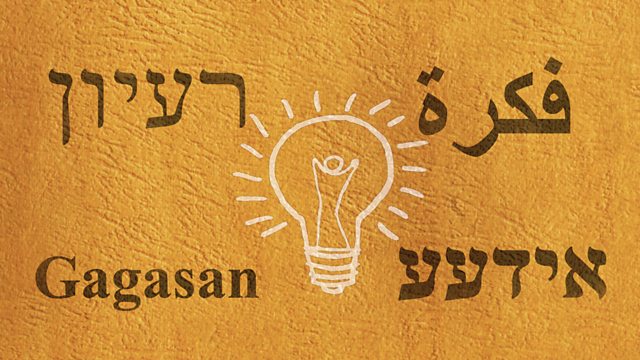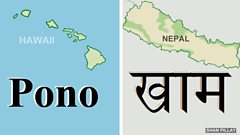Reawakening Language
Reawakening language and culture with linguists Mark Turin, Ghil’ad Zuckermann and Candace Kaleimamoowahinekapu Galla
Many of us are fluent in at least one language and some people are proficient in two, three, four or even more. But not all languages around the world are in good health. In fact it is thought that at least half of the languages that are alive today could cease to be spoken by the end of this century. What can we do about it? How do you re-awaken hibernating or dying languages and the cultures that go with them? Or, is some extinction inevitable? Bridget Kendall discusses the positive things that are happening with some minority languages, focusing on Australia, Nepal and Hawaii with linguists Professor Ghil’ad Zuckermann and Dr. Candace Kaleimamoowahinekapu Galla and anthropologist Dr. Mark Turin.
(Photo: Idea written (clockwise from top) in Hebrew, Arabic, Yiddish and Indonesian. Illustration by Shan Pillay)
Last on
More episodes
Clip
-
![]()
Three languages you may never have heard
Duration: 01:23
Mark Turin
Dr. Mark Turin is an anthropologist, linguist and Associate
Professor of Anthropology at the University of British Columbia and Chair of
the First Nations and Endangered Languages Program.
His research interests are language conservation,
documentation and endangerment; orality, archives and cultural heritage. For
over twenty years, his regional focus has been the Himalayan region
(particularly Nepal, northern India and Bhutan), and more recently, the Pacific
Northwest.
He directs two international research initiatives, Digital
Himalaya and the World Oral Literature Project.
His office and home are located on the traditional,
ancestral, unceded territory of the hən̓q̓əmin̓əm̓-speaking Musqueam people.
Ghil’ad Zuckermann
Professor Zuckermann is Chair of Linguistics and Endangered
Languages and Professor at the University of Adelaide, Australia. He is
Distinguished Visiting Professor at Shanghai Jiao Tong University (China) and
at the Weizmann Institute of Science (Israel), and serves as Editorial Board
member of the Journal of Language Contact.
He is a leading expert of ‘Revivalistics’, a new
trans-disciplinary field of enquiry surrounding language reclamation,
revitalization and re-invigoration. He is particularly interested in multiple
causation, cross-fertilization and horizontal gene transfer in languages, and
the relationship between language and identity.
Ghil’ad’s linguistic interests are wide ranging but on this
‘Forum’ he focuses on indigenous languages in Australia.
Candace Galla
Dr. Candace Kaleimamoowahinekapu Galla is an indigenous language
advocate, educator and researcher. She is an assistant professor in First
Nations Languages and Education at the Department of Language & Literacy
Education at The University of British Columbia, Vancouver, Canada.
Candace was born in Hilo, Hawai’i. and raised in a sugar
plantation town, Pahala, in Kaʻū. She studied in Hawaii before moving to
Tucson, Arizona, for university.
Candace returned to Hawaiʻi to take up the role of Visiting
Assistant Professor in Ka Haka ʻUla O Keʻelikōlani College of Hawaiian Language
at the University of Hawaiʻi in Hilo, before moving to British Columbia, where
she now lives.
Broadcasts
- Mon 25 Jan 2016 02:06GMT�鶹Լ�� World Service except Americas and the Caribbean, Australasia & News Internet
- Mon 25 Jan 2016 05:06GMT�鶹Լ�� World Service Americas and the Caribbean
- Tue 26 Jan 2016 13:06GMT�鶹Լ�� World Service Australasia
- Tue 26 Jan 2016 23:06GMT�鶹Լ�� World Service except News Internet
- Wed 27 Jan 2016 02:06GMT�鶹Լ�� World Service Australasia
Podcast
-
![]()
The Forum
The programme that explains the present by exploring the past



